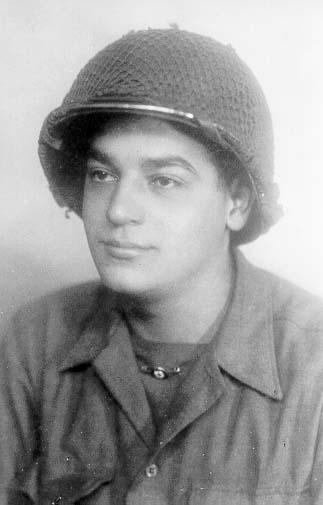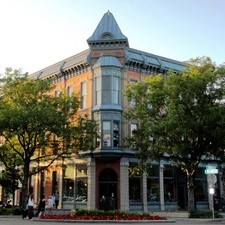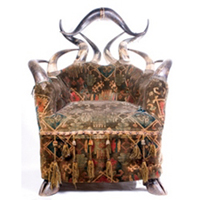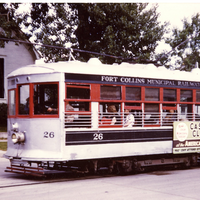It Wasn't All War
It Wasn't All War
Mike Conte
December 15, 1994
Interviewer: Rheba Massey
"My Father Told Me Not to Go"
When nineteen-year-old Mike Conte heard about Pearl Harbor he was shocked. He was working in the Bethlehem Steel shipyards in Staten Island, New York, and went to enlist right away, but they weren't taking men his age yet. His father ripped up the enlistment papers. "You don't know what war is all about," the W.W.I veteran told his son. A few months later, in the face of the draft, his father relented, reasoning it was better to enlist in one's preferred branch of the service. Mike and two buddies wanted the Air Corps, but the recruiting officer pushed the Signal Corps.
After training in various locations, including Fort Dix, where he met his older brother, Mike was assigned to Signal Repair and sent to England on the Queen Mary.
"England was Wonderful"
The ship docked at the Firth of Clyde in Scotland, and the troops traveled by train to Taunton, England, where preparations for receiving the troops were incomplete. Mike's section stayed in a skittle alley (bowling alley.) He was later stationed in Bath and Oxford . When the company was reunited, thousands of men found themselves in a "hell hole" of mud at Warminster. Then good fortune smiled on Mike. His Signal Repair company was sent to the Bristol area where they were quartered in big tents at Norton Maurey Ward, an estate outside of Whitchurch. It was at Whitchurch that Mike would meet Victoria, his bride-to-be.
Even though he hadn't known how to drive before his army training, Mike had received stateside training on a two and a half ton truck -- up on blocks! He was assigned to the motor pool and got to drive all over England, which he describes as "really wonderful". He had more freedom than the average soldier and was thus able to court a young English woman he met at a dance. He recalls leaving her home one night at 11 PM to walk back to camp. He was only a mile away when "all hell broke loose". The nearby seaport of Bristol was being bombed. He ran back to her house, but the family was not affected, having moved their sleeping quarters to the basement of the house when the bombing of England began. His wife-to-be had lost her brother at Salerno, the month before she met Mike, and her family "took" to the young American.
Mike enjoyed his job in the motor pool and the opportunity to see much of England until he was one of the many thousands sent to Salisbury Plains to marshal for the D-Day invasion.
"The Day of the Invasion - I'll Never Forget it as Long as I Live."
Mike got engaged before leaving the Whitchurch area. Everyone knew the invasion was coming, but the Ordnance Tank Outfit Mike was assigned to didn't leave for eleven days, so his view of the invasion was from the English side of the channel at Weymouth. He remembers the planes flying over, H-hour, and afterwards the paratroopers and gliders, and thinking "I got to remember this because I'm going home." Mike was aware of how young he was and that he'd never before been more than a few miles from his home in Staten Island. "The planes all had their lights on while they were over England so the English and the soldiers wouldn't think it was England which was being invaded. . . Then when they hit the English Channel, the lights all went out. As far as you could see that sky . . . I'll never forget that--I'll never forget that."
When it was his time to go, he was on a LST, a Landing Ship Transport, and landed at Utah Beach at 2 am. "Utah Beach was the quietest of all the beaches there. At one time they thought that would be the worst. It wasn't. Omaha Beach was the worst for the Americans."
On the 11th day of the invasion, Mike waited until daylight to cross the field and saw many of the vehicles which had preceded him were stuck in holes, booby traps that did not explode but slowed the tanks.
"The first town I went in was St. Mere Eglise, and the other towns were Carentan, Isigny, and St. Lo. St. Lo was demolished -- demolished! I got four flats going through St. Lo."
At Brecy at 3:00 AM, Mike experienced his first actual air raid and remembers he was "scared stiff." He grabbed his crucifix and went for cover. "When it all ended, a lot of the fellows in the tank outfit were killed even though they were underneath their tanks." Mike described the bomb that did so much damage as "mother bombs." "The case would hit the ground, open up, and these little things would crawl along the ground, roll into a hole, and explode."
Then Mike and the other drivers were assigned to move their signal corps supplies down the "The Red Ball Highway," so called because the troops were moving so fast, the supplies couldn't keep up. They had five different "dumps" or temporary warehouses of supplies and trucked these in rotation until they were near Paris.
"We Got the Flowers, but the Infantry Deserved all the Credit"
Mike said he has always felt bad that the infantry who actually liberated the towns didn't have time to enjoy the accolades bestowed upon the supply and repair divisions. "You felt kind of guilty because these guys came first; but they didn't have time to stop. . . I remember . . all the women jumping up on the truck, giving you flowers and kissing you just like you see in the films."
Mike especially liked Belgium, though he found the road signs in several languages confusing. Before the German occupation, the Belgians already had three languages - French, Walloon and Flemish. Now the road signs showed the German names: Luge for Leige and Aachen for Aix-la-Chapelle. There were also names the U.S. army supplied, like 'N-3'.
Just outside the beautiful little village of Leige, Mike stopped at an ice cream parlor to enjoy a treat; impulsively keeping the menu. He went on to deliver his supplies up the hill to Verviers, and when he returned a few hours later, the ice cream parlor was gone. It was hit by a buzz bomb. He still has the menu.
"Friends in Belgium and the Battle of the Bulge"
Mike spent several weeks in Neufchateau, Belgium, and having more time to himself, he was able to make friends. He made friends with the gendarme (policeman), the father of nine children, who introduced Mike to crepes. A butcher in Leige gave him a secure place to park his truck of supplies, gave him clean Belgian underwear, and a steak and potato dinner. Another family was raising a big white rabbit for Christmas dinner and invited Mike to share. Mike sometimes "liberated" supplies from the mess hall to share with these friends; but as the cans were all the same olive color and the contents identified only by code, he never knew what he was taking. But whether it was peaches or sauerkraut, the families appreciated the American treats.
Mike's unit was not a fighting outfit; so during the Battle of the Bulge in the Ardennes Forest, they were sent back to France, then to Brussels where they had to re-equip English tanks and communications with American "stuff." This work helped turn the tide and Mike's unit received a Presidential Unit Citation. After the Battle of the Bulge, Mike got some R & R and was able to return to his bride-to-be in England. When the war ended, Mike was stationed in Jena which was going to be in the Russian occupation zone. All of the drivers were called back to move an important camera and lens factory from Jena to Weimar in the American zone.
Fortunately the war ended before Mike's unit could be sent to Japan. Mike's captain gave him unlimited furlough to return to England to get married. Mike was on his third week of honeymoon when he got a telegram that they were to be shipped home.
Many of Mike's W.W.II reminiscences are pleasant: seeing beautiful country, a five-day trip to Paris, making friends so dear they'd correspond after the war, a long honeymoon during the war, and a return trip to England where he was remembered by name after 25 years. There were also sad and frightening moments. In Le Havre, France, the people threw rocks at his truck, blaming the Americans for ruining the harbor. Once his unit delayed a few moments and narrowly missed being hit by a buzz bomb. Some nights were so cold, the clothes outside his blanket froze solid. During the Battle of the Bulge, they shared a cold, dark barn with cows while bombers passed overhead. In the morning, soaked with cow urine, they found dead Germans all around. He returned to Neufchateau to learn one of the families he had become friends with had lost a daughter from "friendly fire." And he saw the concentration camp at Buchenwald.
Mike's saddest memory from this two years in the war seems to be the loss of the little six year old Belgium child. He lost his father while he was in Normandy; but it was later after the war was past, that sitting in a darkened movie theater, the loss of his father struck him and he "cried like a little baby."
"My wife gets tired of me talking about the war. My two daughters want to hear it."
"I was 19 when I went in . . these were your courting years . . . you don't take things seriously, at least I didn't. Mike and his English bride, Victoria, were married on October 10, 1945, at St. Megellan church outside of Bristol. "I still remember that. Her parents used all their coupons to have a nice cake." They honeymooned at a seashore resort; one they would return to 45 years later.
Mike got home November 27, l945 and his wife followed him in May, 1946 on a bright white "GI Bride Ship." Even after using his GI bill to go to school, Mike found jobs scarce after the war; but in 1950 he was hired by Ford Motor Company in Metuchen, New Jersey and worked there for 30 years. His daughters attended Colorado colleges, and that is how Mike and Victoria came to make their home in Fort Collins.


Preserving the history of Fort Collins, Colorado & the Cache la Poudre region






